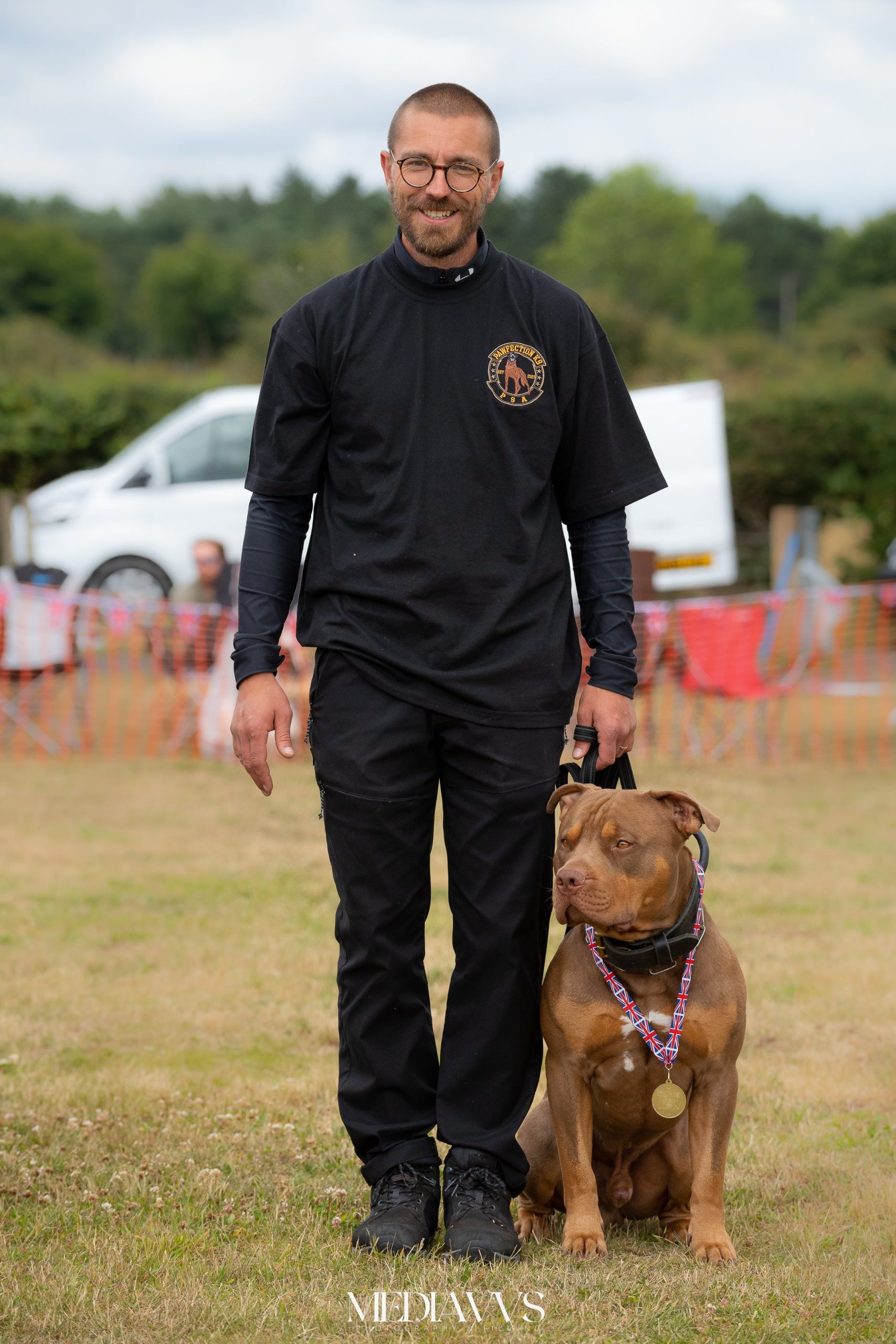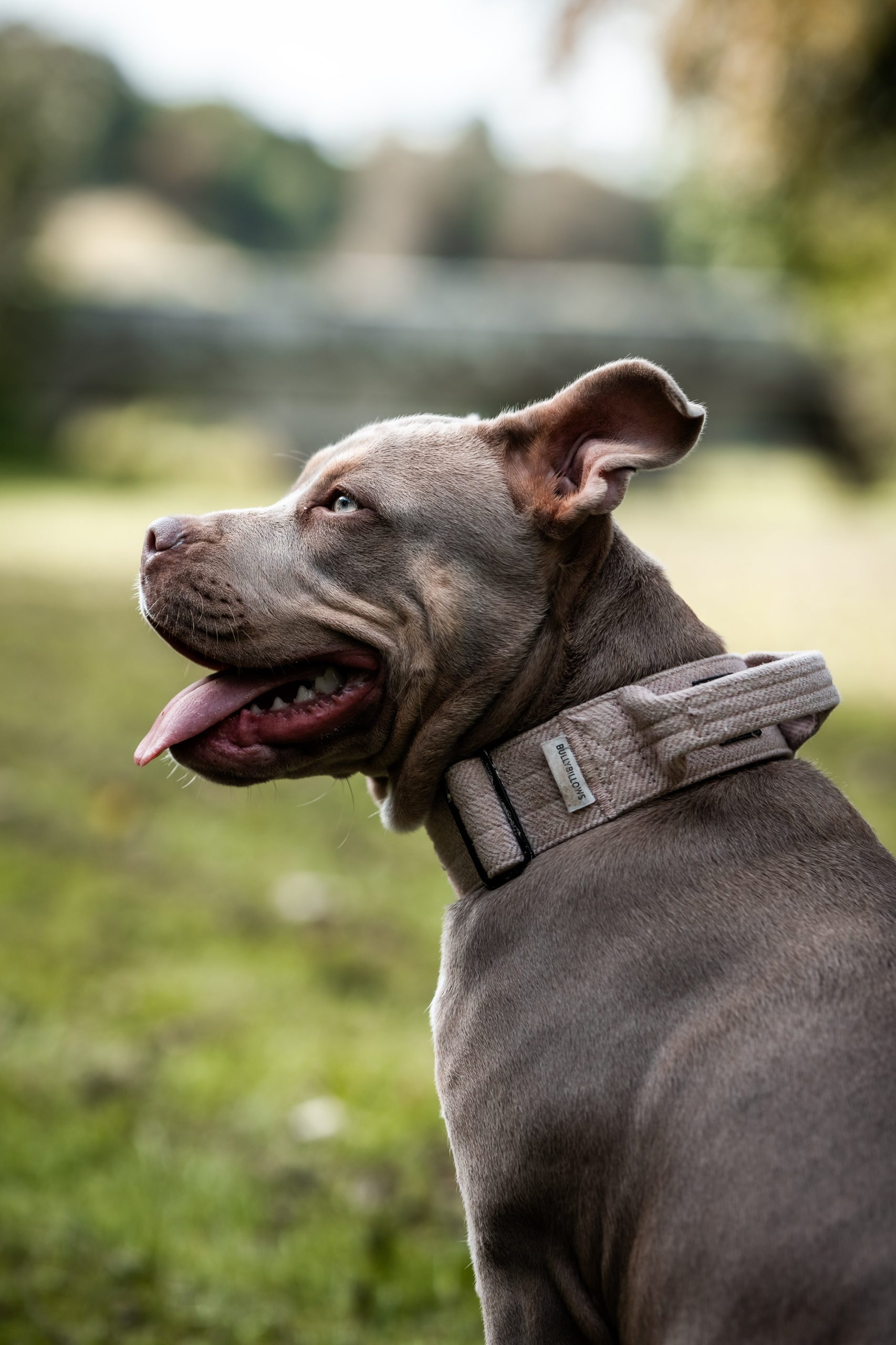
They’ve never ever done anything wrong,” one woman says of her three XL bully dogs. “We’ve owned bull breeds for 10 years and they’ve never put a foot wrong, we’ve never had altercations in public, we have had nothing but a positive experience.”
Heather Halls and her husband Chris have spent the past few weeks in disbelief after Rishi Sunak announced in September that American XL bully dogs would be banned in the UK following a spate of high-profile attacks and fatalities.
Not only do three of their family dogs fall into this category, but Chris is a professional dog trainer specialising in bulldog breeds, meaning that their entire livelihood is now at stake. They also compete in the Protection Sports Association, by which two of their XL bullies have been awarded titles.

“Essentially, our whole world and what we’ve worked towards in the last few years is about to get flipped on its head,” says Heather.
The couple have now joined forces with other XL bully owners to launch an official campaign to challenge the government’s stance, with more than £86,000 raised in a matter of days to support legal action.
Campaigners from Don’t Ban Me – Licence Me are asking the Department for the Environment, Food and Rural Affairs (Defra) to rethink their plans and are fundraising for a judicial review.
Poor breeding to blame for XL bullies attacking people, says dog trainer
With the support of their barrister John Cooper KC, they sent a warning of their intention to launch legal action to the environment secretary Therese Coffey last Thursday, as they hope to scrap the planned ban in favour of tightened laws around breeding and ownership.
Under new legislation, it will be illegal to sell, breed or abandon an XL bully-type dog from 31 December, while it will be an offence to own one from 1 February 2024 unless it is registered to the government’s database, the Index of Exempted Dogs.

Once their animal is registered, owners will have to abide by strict regulations, which include keeping their dogs muzzled and on a lead at all times in public, having them neutered and microchipped, and having to carry a certificate of exemption at all times to show police officers or council dog wardens.
Alongside descriptions of head size and physical features, the government has defined an American XL bully as an adult male from 20in in height, or an adult female from 19in. However, given that XL bullies have never been defined as an official breed, this has confused owners of cross-breeds such as mastiffs and mongrels.
The decision to ban the breed came after deaths relating to XL bully attacks, including those of 10-year-old Jack Lis and 17-month-old Bella-Rae Birch. Two people were injured in recent days in Mansfield by a suspected XL bully, while one report holds the breed responsible for nearly 50 per cent of all dog attacks in the UK.
Charities with the banned breed in their care will now receive £100 compensation for euthanising an XL bully, while owners will get £200 compensation if a vet euthanises their dog.

Speaking to The Independent, Sophie Coulthard, an organiser of the campaign group, says: “The problem with this knee-jerk reaction is that it won’t stop dog attacks. We need to focus on licensing and educating owners, with compulsory training and tougher punishments to prevent people from impulse-buying dogs.”
Sophie has owned her XL bully, Billy, for the last year, and has developed a following on TikTok by posting educational videos of his training as well as details of the proposed ban.
“One thing we’ve found is that people are really misinformed on the full impact of the ban,” she says. “What the government is asking me to do is look at their guidelines and commit him to a life on the muzzle, not go on holidays with him, have him muzzled in the car.
“There’d be no more playing with a toy in the park, anyone in social housing could lose their housing or their dog, you can no longer hire private fields to take dogs off the lead. It is really reducing the quality of life for these dogs.”
The group is arguing for the UK to take a similar approach to Canada’s Calgary model, an educational, licensing and stronger enforcement programme that has successfully reduced the number of dog bites by 70 per cent.

“I understand there’s been attacks, and I fully sympathise with anyone who has been a victim, because it’s horrific,” Heather says. “Dog ownership is a complete and utter mess, and people got these dogs in lockdown and haven’t socialised them or trained them. My son was bitten by a dachshund that shot out of a front door, so it’s not just XL bullies.
“Licensing is the right way forward. It’s proven to work in other countries and you can’t ignore the evidence that it works.”
Since the announcement, her five-year-old son panics each time he hears a siren, out of fear that police officers will arrive to take his dogs away. “Our dogs are our family pets,” says Heather. “I’ll do anything to keep my dogs safe. I will fight with my last breath.”
Guide Dogs of America Needs Volunteer ‘Puppy Raisers’

Working with wonderful woofers, the sort of furry joy-bringers that make a difference in people’s lives?
Pitching in with a pack of incredible pups can make a lasting impression on a person’s mind, outlook, and, for sure, their spirit, too.
And that chance to lend a hand, your time, some empathy and understanding, and a whole lot of love is coming up, on Dec. 11, thanks to a “puppy raiser” training session with Guide Dogs of America.
This is a virtual happening, via Zoom, and it will be the final online information event before in-person gatherings return to the Sylmar campus in 2022.
Guide Dogs of American pairs trained pups with “… individuals who are blind/visually impaired and service dogs for veterans and children with autism,” with dogs also being placed in “hospitals, schools, and courtrooms.”
“Our highly skilled canines become trusted companions that increase people’s confidence, mobility, and independence. All programs and services, including transportation, personalized training, room/board, and postgraduate support, are provided at no cost to the recipient,” states the organization on its site.
And helping the organization achieve its mission?
Puppy raisers, those dedicated volunteers who are among some of the first people a young, in-training dog gets to know, trust, and adore.
If you choose to pursue volunteering for this life-changing role, there’ll be a few initial considerations, as well as matters you’ll want to mull.
One consideration? Where you reside. You and the puppy in your care will need to call upon the Sylmar campus on occasion, and attendance at both monthly puppy group meetings and “puppy kindergarten classes” is required.
The Dec. 11 information session will address what you can expect from meetings and classes, as well as what at-home life will be like with the future guide dog you’re helping to raise.
Questions covered include the breeds and types of puppies that volunteers raise, what can be expected in terms of puppy proofing and such, what out-of-pocket expenses might look like, and how long the puppy will live in your home.
And, yes: “(W)hat happens when the dogs ‘go off to college’ to begin formal training” is also a central topic of the session, as well as how dogs are paired with their forever people once they’ve graduated.
The word straight from Sylmar? “We ALWAYS need puppy raisers,” says Stephanie Colman, the coordinator of the puppy program.
So even if you can’t join the December Zoom, you can plan to attend an in-person information session on the Guide Dogs of America campus, in early 2022.
Could this be your new year’s resolution?



 I’m sorry to listen to that you just haven’t acquired any birthday needs but, however don’t fear, there’s nonetheless time for them
I’m sorry to listen to that you just haven’t acquired any birthday needs but, however don’t fear, there’s nonetheless time for them 

Leave a Reply